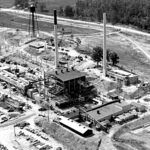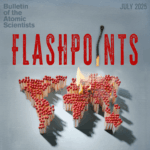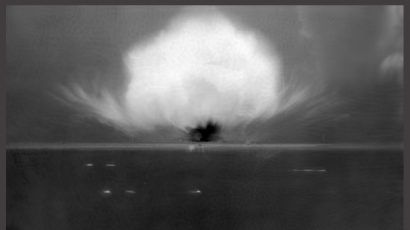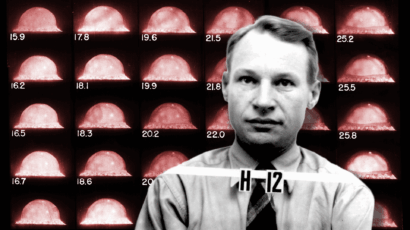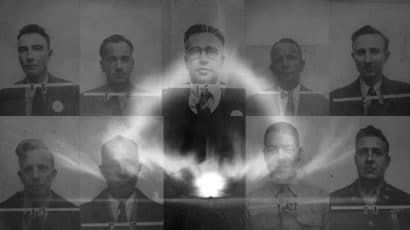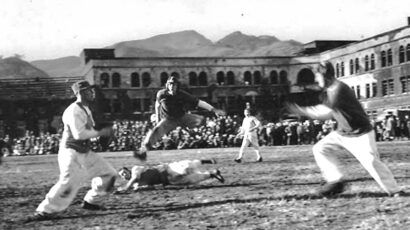Nobel laureates and nuclear experts gather at University of Chicago on Trinity anniversary, press world leaders for action on nuclear dangers
By John Mecklin | July 16, 2025
 Two Nobel laureates involved in organizing the Nobel Laureate Assembly for the Prevention of Nuclear War, Brian Schmidt (left) and David Gross. Image courtesy of John Mecklin
Two Nobel laureates involved in organizing the Nobel Laureate Assembly for the Prevention of Nuclear War, Brian Schmidt (left) and David Gross. Image courtesy of John Mecklin
After two-and-a-half days of meetings in a mostly sunny midsummer Chicago, concerned Nobel Prize laureates and many of the world’s top experts on nuclear weapons spoke out on a dark subject: the high and seemingly rising prospect of nuclear war. The Nobel Laureate Assembly for the Prevention of Nuclear War issued a declaration Wednesday—keyed to the 80th anniversary of the first nuclear weapons explosion in New Mexico, known as the Trinity Test—that presented a series of practical recommendations to world leaders for reducing the nuclear threat.
The impetus for the assembly came from Nobel laureates who, after issuing their own declaration on nuclear danger in 2024, felt public attention was not commensurate to the threat. Brian Schmidt, who won the Nobel Prize in Physics in 2011, said the idea of the assembly initially arose last year at a meeting in Lindau, Germany, when Nobel laureates from more than 10 countries signed the “Mainau Declaration 2024 on Nuclear Weapons,” an echo of a Nobel laureates declaration on the same subject in 1955.
“We were discussing at this meeting of laureates, how this seemed to have gone off the radar of the world. And yet we were saying it’s, to our mind, the existential risk,” Schmidt said.
Daniel Holz, a University of Chicago astrophysicist and chair of the Bulletin’s Science and Security Board, was a co-organizer of the three-day assembly, held at the university’s David Rubenstein Forum this week. “Needless to say, it’s a uniquely dangerous time, and there’s been a growing awareness that that’s the case,” Holz said. “And one of the main issues is, as the dangers have been increasing, I think the world’s attention has been distracted by other things…. After talking with David Gross (winner of the 2004 Nobel Prize in Physics) and Brian Schmidt, we thought having a conference that would bring the world’s experts and many the Nobel laureates who care about these issues and want to address them—that that would be effective.
“So that was the genesis of this meeting, and here we are, about a year later.”
The assembly consisted of expert panel discussions on a series of nuclear-weapons related subjects, with most panels including a Nobel laureate. The off-the-record presentations spanned an interconnected array of concerns that make up the nuclear threat landscape, including the potentially civilization-ending prospect of nuclear winter—a significant and lasting cooling of the Earth that could be caused by massive amounts of smoke that cities immolated by a nuclear attack inject into the stratosphere. The National Academies of Sciences, Engineering, and Medicine recently issued a long-awaited report, “The Potential Environmental Effects of Nuclear War,” that points out the need for far more research into those effects, research that the US government has so far largely declined to fund, Rutgers University climatologist Alan Robock pointed out in an interview outside the assembly. One of the world’s leading experts on nuclear winter, Robock said, “We’re trying to quantify the amount of smoke you get [in various nuclear war scenarios]. It depends of course on the size of the weapons and the targets, but I think the evidence is clear that there’d be a lot of smoke … and billions of people who die [from a collapse of agriculture in large parts of the world].”
Other subjects covered were equally ominous: the use of artificial intelligence in nuclear weapons systems; research into the psychology of decision-making related to nuclear crises; old and new proliferation risks; the revitalization of strategic stability talks among nuclear powers; nuclear testing; the history and future of nuclear close calls; and missile defense and the weaponization of space.
With his executive order that the United States pursue a comprehensive Golden Dome missile defense program, President Trump has put defense against nuclear attack at the top of the US security agenda. Bob Latiff, a retired Air Force major general and a Bulletin Science and Security Board member, said his presentation to the assembly about missile defense centered on three primary points: that a completely effective missile defense system remains technically impossible (although a partially effective system could be built); that a comprehensive system of the sort the president’s Golden Dome anticipates would be enormously expensive, requiring thousands of satellites and interceptors and costing far more than the $175 billion Trump has suggested; and that he believes “missile defenses are destabilizing and unnecessary and inspire arms races. Those were the points I was trying to make that we should be talking about.”
In an interview after his presentation, which dealt in part with what many believe was the world’s closest approach to nuclear war—the Cuban Missile Crisis—prominent nuclear historian Alex Wellerstein noted that “it’s very clear that people’s understandings of the risks in real time are often completely wrong. And so there’s something disquieting about the idea that global leaders all the time choose to either create the context that could be a crisis, or to say, essentially, ‘this is a crisis.’ But they also have very poor track record of anticipating what risks they are getting into, and what they’re willing to do.”
The assembly’s declaration—addressed to leaders of the world’s nuclear powers and the general public—spans the nuclear threat landscape, recommending:
- That all countries reaffirm their commitments to a moratorium on nuclear tests and to pursue the prompt entry into force of the Comprehensive Nuclear Test Ban Treaty.
- That Russia and the United States immediately enter into negotiations on a successor to the 2010 New Strategic Arms Reduction Treaty, remain committed to the treaty’s limits during negotiations, and expand dialogue to address their full nuclear arsenals. Also, the declaration calls on China to immediately enter into discussions on its expanding nuclear arsenal.
- That all countries engage in increased cooperative dialogue on the scientific, legal, and military implications of artificial intelligence and other emerging technologies. Particularly, the assembly called on nuclear armed states to ensure meaningful human control over nuclear command and control and to institute a “two-person rule” ensuring that at least two individuals are involved in any decision about the use of nuclear force.
- That China, Russia, and the United States acknowledge the interrelationship between strategic offensive and defensive arms and forgo massive investments in strategic missile defense.
- That all nations reaffirm the Outer Space Treaty and work to update it to account for new technologies.
- That nuclear-armed countries expand secure communications lines with one another and increase the number and frequency of multilateral dialogues on crisis prevention and management.
- That every nation publicly recommit nonproliferation and disarmament obligations in the Non-Proliferation Treaty (NPT) and condemn proliferation by any state— including allies.
- That all countries increase investments and cooperative research on the environmental, social, military, and economic impacts of nuclear conflict, and to support the upcoming UN Independent Scientific Panel on Nuclear War Effects.
- And finally, that scientists, academics, civil society, and communities of faith help create the necessary political pressure on global leaders to implement nuclear risk reduction measures.
Organizers of the assembly said they were keenly aware that its declaration needed to spur widespread public support to effect actual improvement in the world’s nuclear situation. To gain that support, the group was interested in innovative ways of reaching wider audiences, Gross said during a question-and-answer session after the declaration was presented. In one such effort, Bulletin CEO Alex Bell noted, the assembly sponsored a performance by the Grammy Award-winning Kronos Quartet and Allison Russell of Bob Dylan’s “A Hard Rain’s a-Gonna Fall” at the Logan Center for the Arts in Chicago Wednesday evening. The Kronos Quartet has recorded two covers of the song with an array of prominent musical artists that range from Willie Nelson and Ringo Starr to Iggy Pop and Laurie Anderson and beyond.
Organizers of the assembly also made clear that the choice of its venue—the University of Chicago—was purposeful, because of the university’s history as the site of the first controlled, sustained nuclear reaction and, subsequently, its role in supplying scientists who worked in the Manhattan Project and on the creation of the first nuclear weapons. After the atomic bombings of Hiroshima and Nagasaki in 1945, the university also was home to the Atomic Scientists of Chicago, a group that worked to warn the public and the country’s leaders of the danger of nuclear weapons. That group founded the Bulletin in December 1945.
Together, we make the world safer.
The Bulletin elevates expert voices above the noise. But as an independent nonprofit organization, our operations depend on the support of readers like you. Help us continue to deliver quality journalism that holds leaders accountable. Your support of our work at any level is important. In return, we promise our coverage will be understandable, influential, vigilant, solution-oriented, and fair-minded. Together we can make a difference.



